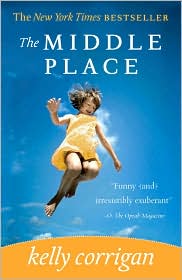This weekend, I finished reading Kelly Corrigan's memoir The Middle Place. I typically do not read memoirs--occasionally, I'll pick up one by an old movie star or a well-known author, really enjoy it and remind myself to get another one soon. I first heard of Corrigan's book from the e-mail alerts I receive from Barnes and Noble and Borders. Every time I walked into a bookstore, her book was on a table in the front. I would read the back time after time, and then put it down. After looking it up on Amazon, I saw that the reviews were pretty good, but I still didn't relate so much to the premise. I wasn't a mother going through cancer treatment and dealing becoming an adult, ie, running to parents like you are an adolescent when you are really middle-aged to tell them about your achievements, per Corrigan's definition. I checked it out at the library despite my initial reservations--I may be in the same situation someday and it would be interesting to see how Corrigan handles the shock of such a serious diagnosis. Also, my grandmother was diagnosed four years ago with Stage 4 ovarian cancer and although she has been extremely responsive to treatment, I thought it would really help me to better understand what is going on in a cancer patient's mind.
I'm glad that I picked up this book. It was a fast read and Corrigan was direct from the start. In fact, that is what I liked best about The Middle Place. It is so brave. Corrigan is not only brave by telling her story as a cancer survivor, vividly recalling the treatment, her sickness from it and her inability to pick up her young daughters after surgery, among other things. She is so honest about her feelings, her reactions and her interactions with family. The parallel story of this book is that Corrigan's father, Greenie, is also diagnosed with cancer. He is a bigger-than-life kind of guy--everyone loves George Corrigian, especially Kelly. He has been her cheerleader and now, even when he needs a cheerleader himself, he stays upbeat and positive, turning to his family, friends and his life-long commitment to the Catholic Church. It's hard for Corrigan to handle her own mortality but it seems more difficult for her to handle her father's mortality.
There are several parts of this book that made me cringe, in a good way. Kelly talks about her father constantly, and although I know that is the storyline of the book, I couldn't help but think of her mother. It must be hard for Mary Corrigan to read a book that makes it seem like her daughter loves her father more. By the end, Kelly seems to become much closer with her mother. Maybe it was becoming a mother herself but she seems to identify with her more than she did when she was a teenager. She wasn't one of those girls who thought her mother was her best friend. She was a daddy's girl, but as she moves out of 'the middle place,' she understands her mother much better.
In addition to stories from growing up, Kelly also talks about being jealous of her husband's parents and his connection with them (something I think that many women feel but are afraid to admit to their spouses, nonetheless put it out there for everyone to read), her tendencies to be self-absorbed and wishing she lived closer to her parents as they age. After reading The Middle Place, I feel like I know Kelly Corrigan and her family. I'm reminded of a comment I read on Amazon that said something like, "the book was all about her. She talked so much about herself." The Middle Place is a memoir so that is to be expected, and after reading it, I'm not sure if there is anyone else I'd rather hear talk about herself.
Wednesday, March 31, 2010
Subscribe to:
Post Comments (Atom)


No comments:
Post a Comment